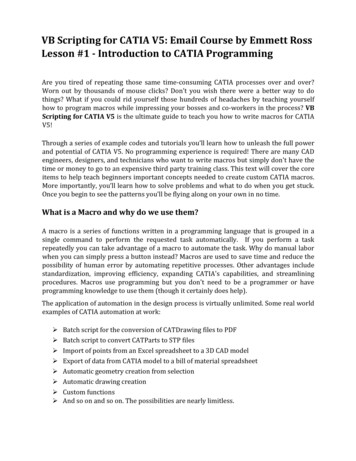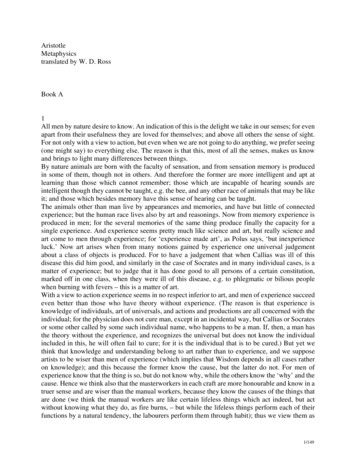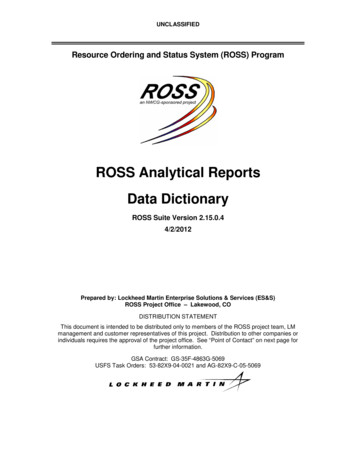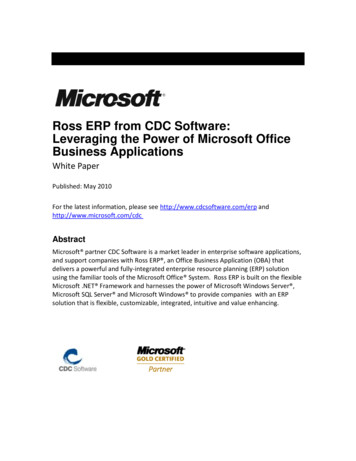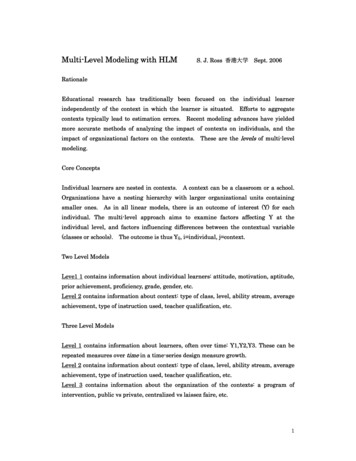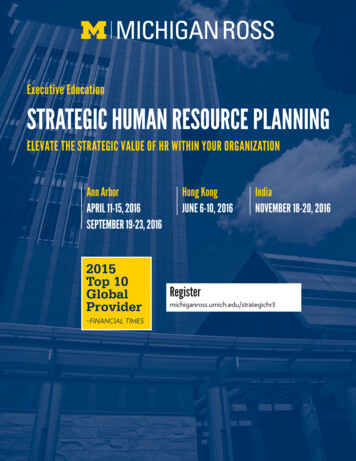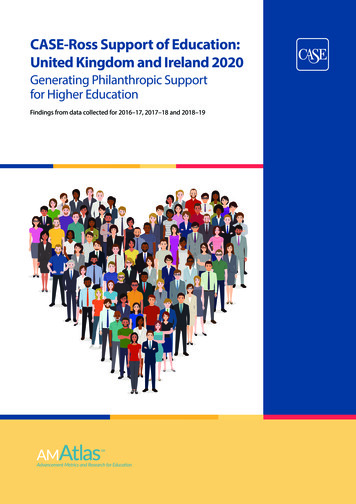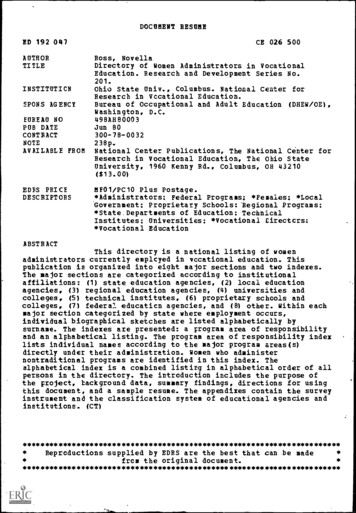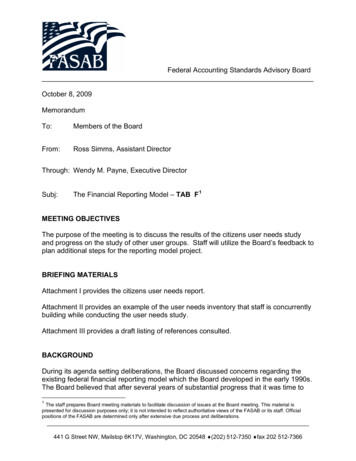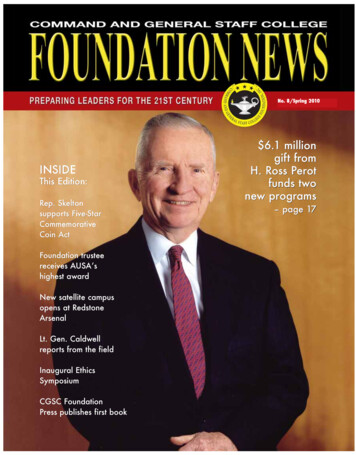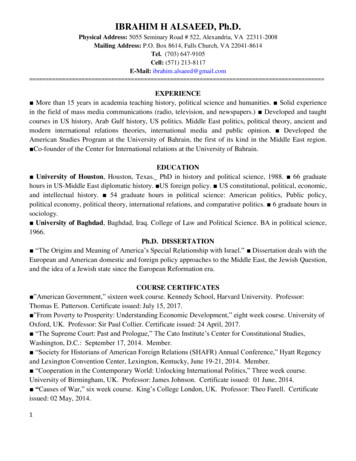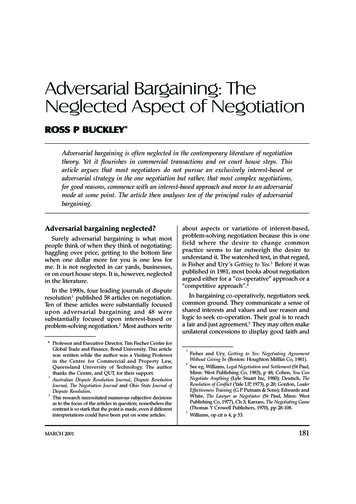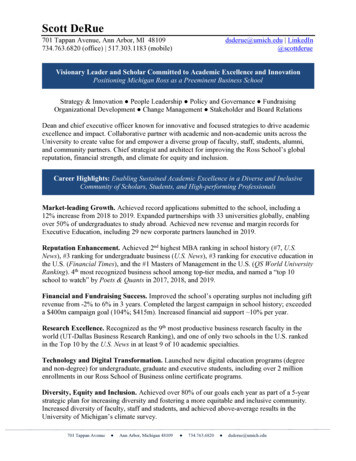
Transcription
Scott DeRue701 Tappan Avenue, Ann Arbor, MI 48109734.763.6820 (office) 517.303.1183 (mobile)dsderue@umich.edu LinkedIn@scottderueVisionary Leader and Scholar Committed to Academic Excellence and InnovationPositioning Michigan Ross as a Preeminent Business SchoolStrategy & Innovation People Leadership Policy and Governance FundraisingOrganizational Development Change Management Stakeholder and Board RelationsDean and chief executive officer known for innovative and focused strategies to drive academicexcellence and impact. Collaborative partner with academic and non-academic units across theUniversity to create value for and empower a diverse group of faculty, staff, students, alumni,and community partners. Chief strategist and architect for improving the Ross School’s globalreputation, financial strength, and climate for equity and inclusion.Career Highlights: Enabling Sustained Academic Excellence in a Diverse and InclusiveCommunity of Scholars, Students, and High-performing ProfessionalsMarket-leading Growth. Achieved record applications submitted to the school, including a12% increase from 2018 to 2019. Expanded partnerships with 33 universities globally, enablingover 50% of undergraduates to study abroad. Achieved new revenue and margin records forExecutive Education, including 29 new corporate partners launched in 2019.Reputation Enhancement. Achieved 2nd highest MBA ranking in school history (#7, U.S.News), #3 ranking for undergraduate business (U.S. News), #3 ranking for executive education inthe U.S. (Financial Times), and the #1 Masters of Management in the U.S. (QS World UniversityRanking). 4th most recognized business school among top-tier media, and named a “top 10school to watch” by Poets & Quants in 2017, 2018, and 2019.Financial and Fundraising Success. Improved the school’s operating surplus not including giftrevenue from -2% to 6% in 3 years. Completed the largest campaign in school history; exceededa 400m campaign goal (104%; 415m). Increased financial aid support 10% per year.Research Excellence. Recognized as the 9th most productive business research faculty in theworld (UT-Dallas Business Research Ranking), and one of only two schools in the U.S. rankedin the Top 10 by the U.S. News in at least 9 of 10 academic specialties.Technology and Digital Transformation. Launched new digital education programs (degreeand non-degree) for undergraduate, graduate and executive students, including over 2 millionenrollments in our Ross School of Business online certificate programs.Diversity, Equity and Inclusion. Achieved over 80% of our goals each year as part of a 5-yearstrategic plan for increasing diversity and fostering a more equitable and inclusive community.Increased diversity of faculty, staff and students, and achieved above-average results in theUniversity of Michigan’s climate survey.701 Tappan Avenue Ann Arbor, Michigan 48109 734.763.6820 dsderue@umich.edu
EDUCATIONMichigan State University, Eli Broad Graduate School of ManagementPh.D. in Business Administration, 2007University of North Carolina at Chapel Hill, Kenan-Flagler Business SchoolBachelors of Science with Honors in Business Administration, 1999EMPLOYMENT2016-Edward J. Frey DeanStephen M. Ross School of Business, University of Michigan2016-Stephen M. Ross Professor of BusinessStephen M. Ross School of Business, University of Michigan2013-Professor of Management and OrganizationsStephen M. Ross School of Business, University of Michigan2015-2016Gilbert and Ruth Whitaker Professor of Business AdministrationStephen M. Ross School of Business, University of Michigan2014-2016Associate DeanStephen M. Ross School of Business, University of Michigan2011-2016Faculty Director and Founder, Sanger Leadership CenterStephen M. Ross School of Business, University of Michigan2011-2014Stein Research ScholarStephen M. Ross School of Business, University of Michigan2010-2016Faculty Director, Emerging Leaders ProgramStephen M. Ross School of Business, University of Michigan2010-2011Bank One Corporation Assistant Professor of Business AdministrationStephen M. Ross School of Business, University of Michigan2007-2013Assistant Professor of Management and OrganizationsStephen M. Ross School of Business, University of Michigan2003-2007Lecturer and Research AssistantEli Broad College of Business, Michigan State University701 Tappan Avenue Ann Arbor, Michigan 48109 734.763.6820 dsderue@umich.edu
2003-2004Senior Marketing ManagerHinckley Yacht Company1999-2003Private Equity Analyst and Management ConsultantMonitor Group (now Monitor Deloitte)BOARD SERVICE2019-Board MemberAnn Arbor Sports Commission2018-Board Member, Human Capital Committee, and Finance CommitteeThe Conference Board2018-Member of the Education and Industry ForumFederal Reserve Bank of New York2017-Board Member and Audit CommitteeEquinox Holdings2016-Chairperson and Board MemberWilliam Davidson InstituteAWARDS & 2010201020092009200820072006Cummings Scholarly Achievement Award, Academy of ManagementDistinguished Young Alumni Award, University of North Carolina at Chapel HillBest Paper Award, Journal of ManagementBest Leadership Paper Award, Ivey Business SchoolEarly Career Achievement Award, HR Division of the Academy of ManagementTop 50 Most Influential Business Professors of 2013, MBARankings.netStein Research Scholar, Stephen M. Ross School of BusinessExecutive Education Teaching Award, Stephen M. Ross School of BusinessOutstanding Reviewer Award, Academy of Management JournalTop 40 Business School Professors Under 40, Poets & Quants, CNN/MoneyMaking Connections Award, OB Division of the Academy of ManagementOutstanding Service Award, MED Division of the Academy of ManagementBank One Corp. Faculty Research Award, Stephen M. Ross School of BusinessOutstanding Reviewer Award, MED Division of the Academy of ManagementS. Rains Wallace Dissertation Research Award, Society for I/O PsychologyOutstanding Reviewer Award, OB Division of the Academy of ManagementDissertation Completion Fellowship, Michigan State UniversityLewis Quality Award, Michigan State University, Eli Broad College of Business701 Tappan Avenue Ann Arbor, Michigan 48109 734.763.6820 dsderue@umich.edu
2005200420031999Ulrich-Lake Award for Excellence in Human Resource Management ScholarshipLewis Quality Award, Michigan State University, Eli Broad College of BusinessUniversity Distinguished Fellowship, Michigan State UniversityExcellence in Human Resource Management, Kenan-Flagler Business SchoolBOOKSMcCauley, C. D., DeRue, D. S., Yost, P. & Taylor, S. (2013). Experience-driven LeaderDevelopment: Strategies, Tools, and Practices. San Francisco, CA: Jossey-Bass/Wiley.REFERRED SCHOLARLY PUBLICATIONSCha, S. E., Kim, S. S., Hewlin, P. F., & DeRue, D. S. (2020). Turning a Blind or Critical Eye toLeader Value Breaches: The Role of Value Congruence in Employee Perceptions ofLeader Integrity. Journal of Leadership & Organizational Studies, 27, 286-306.Karam, E. P., Hu, J., Davison, R. B., Juravich, M., Nahrgang, J. D., Humphrey, S. E. and DeRue,D. S. (2019). Illuminating the ‘Face’ of Justice: A Meta-Analytic Examination ofLeadership and Organizational Justice. Journal of Management Studies, 56, 134-171.Ilies, R., Wagner, D., Wilson, K., Ceja, L., Johnson, M., DeRue, S. and Ilgen, D. (2017). Flow atwork and basic psychological needs: Effects on well-being. Applied Psychology: AnInternational Review, 66, 3-24.Wellman, N., Mayer, D. M., Ong, M., & DeRue, D. S. When are do-gooders treated badly?Legitimate power, role expectations, and reactions to moral objection in organizations.(2016). Journal of Applied Psychology, 101, 793-814.Wilson, K. S., DeRue, D. S., Howe, M., Matta, F., & Conlon, D. E. (2016). Personality similarityin negotiations: Testing the dyadic effects of similarity in interpersonal traits and the useof emotional displays on negotiation outcomes. Journal of Applied Psychology, 101,1405-1421.DeRue, D. S., Nahrgang, J. D., & Ashford, S. J. (2015). Interpersonal perceptions and thestructuring of leadership in groups. Organization Science, 26, 1192-1209.Hollenbeck, J. R., DeRue, D. S., & Nahrgang, J. D. (2015). The opponent process theory ofleadership succession. Organizational Psychology Review, 5, 333-363.Aime, F., Humphrey, S., DeRue, D. S., & Paul, J. (2014). The riddle of heterarchy: Powertransitions in cross-functional teams. Academy of Management Journal, 57, 327-352.701 Tappan Avenue Ann Arbor, Michigan 48109 734.763.6820 dsderue@umich.edu
Nahrgang, J. D., DeRue, D. S., Hollenbeck, J. R., Spitzmuller, M., Jundt, D. K., & Ilgen, D. R.(2013). Goal setting in teams: The impact of learning and performance goals on processand performance. Organizational Behavior and Human Decision Processes, 122, 12-21.Johnson, M. D., Hollenbeck, J. R., DeRue, D. S., Barnes, C. M., & Jundt, D. (2013). Functionalversus dysfunctional team change: The role of problem diagnosis and externalinterventions for self-managed teams. Organizational Behavior and Human DecisionProcesses, 122, 1-11.DeRue, D. S., Nahrgang, J. D., Hollenbeck, J. R., & Workman, K. (2012). A quasi-experimentalstudy of after-event reviews and leadership development. Journal of Applied Psychology,97, 997-1015.DeCelles, K. A., DeRue, D. S., Margolis, J. D., & Ceranic, T. L. (2012). Does power corrupt orenable? When and why power facilitates self-interested behavior. Journal of AppliedPsychology, 97, 681-689.Barnes, C. M., Hollenbeck, J. R., Jundt, D., K., DeRue, D. S., & Harmon, S. J. (2011). Mixingindividual and group incentives: Best of both worlds or social dilemma? Journal ofManagement, 37, 1611-1635.DeRue, D. S. (2011). Adaptive leadership theory: Leading and following as a complex adaptiveprocess. Research in Organizational Behavior, 31, 125-150.DeRue, D. S., Nahrgang, J. D., Wellman, N., & Humphrey, S. E. (2011). Trait and behavioraltheories of leadership: A meta-analytic test of their relative validity. PersonnelPsychology, 64, 7-52.Lam, C. F., DeRue, D. S., Karam, E.P., & Hollenbeck, J. R. (2011). The impact of feedbackfrequency and positive affective state on task performance: Challenging the “More isBetter” assumption. Organizational Behavior and Human Decision Processes, 116, 217228.DeRue, D. S. & Ashford, S. J. (2010). Who will lead and who will follow? A social process ofleadership identity construction in organizations. Academy of Management Review, 35,627-647.DeRue, D. S., Barnes, C. M., & Morgeson, F. P. (2010). Understanding the motivationalcontingencies of team leadership. Small Group Research, 41, 621-651.DeRue, D. S., Hollenbeck, J. R., Ilgen, D. R., & Feltz, D. (2010). Efficacy dispersion in teams:Moving beyond agreement and aggregation. Personnel Psychology, 63, 1-40.Morgeson, F. P., DeRue, D. S, & Karam, E. (2010). Leadership in teams: A functional approachto understanding leadership structures and processes. Journal of Management, 36, 5-39.701 Tappan Avenue Ann Arbor, Michigan 48109 734.763.6820 dsderue@umich.edu
DeRue, D. S., Conlon, D. E., Moon, H., & Willaby, H. W. (2009). When is straightforwardness aliability in negotiations? The role of integrative potential and power. Journal of AppliedPsychology, 94, 1032-1047.DeRue, D. S. & Wellman, N. (2009). Developing leaders via experience: The role ofdevelopmental challenge, learning orientation, and feedback. Journal of AppliedPsychology, 94, 859-875.Barnes, C. M., Hollenbeck, J. R., Wagner, D. T., DeRue, D. S., Nahrgang, J. D., & Schwind, K.(2008). Harmful help: The cost of backing up behavior in teams. Journal of AppliedPsychology, 93, 529-539.DeRue, D. S., Hollenbeck, J. R., Ilgen, D. R., Johnson, M. D., & Jundt, D. (2008). How differentteam downsizing approaches influence team-level adaptation and performance. Academyof Management Journal, 51, 182-196.DeRue, D. S., & Morgeson, F. P. (2007). Stability and change in person-team and person-role fitover time: The effects of growth satisfaction, performance, and self efficacy. Journal ofApplied Psychology, 92, 1242-1253.Ilies, R., Schwind, K., Wagner, D. T., Johnson, M. D., DeRue, D. S., & Ilgen, D. R. (2007).When can employees have a family life? The effects of daily workload and affect onwork-family conflict and social activities at home. Journal of Applied Psychology, 92,1368-1379.Morgeson, F. P., & DeRue, D. S. (2006). Event criticality, urgency, and duration: Understandinghow events disrupt teams and influence team leader intervention. Leadership Quarterly,17, 271-187.Hollenbeck, J. R., DeRue, D. S., & Guzzo, R. (2004). Bridging the gap between I/O research andHR practice: Improving team composition, team training, and team task design. HumanResource Management, 43, 353-366.Hollenbeck, J.R., DeRue, D.S., & Mannor, M. J. (2006). Statistical power and parameter stabilitywhen subjects are few and tests are many: Comment on Peterson, Smith, Martorana, andOwens (2003). Journal of Applied Psychology, 91, 1-5.Cable, D. M., & DeRue, D. S. (2002). The convergent and discriminant validity of subjective fitperceptions. Journal of Applied Psychology, 87, 875-884.701 Tappan Avenue Ann Arbor, Michigan 48109 734.763.6820 dsderue@umich.edu
INVITED SCHOLARLY PUBLICATIONSMyers, C. G. & DeRue, D. S. (2017). Agency in vicarious learning at work. In J. E. Ellingson &R. A. Noe (Eds.), Autonomous learning in the workplace: 15–37. New York: Routledge.DeRue, D. S., & Myers, C. G. (2014). Leadership development: A review and agenda for futureresearch. In D. V. Day (Ed.), Oxford Handbook of Leadership and Organizations (p. 829852). Oxford: Oxford University Press.DeRue, D. S., Ashford, S. J., & Myers, C. G. (2012). Learning agility: In search of conceptualclarity and theoretical grounding. Industrial and Organizational Psychology:Perspectives on Science and Practice, 5, 258-279.DeRue, D. S., Ashford, S. J., & Myers, C. G. (2012). Learning Agility: Many Questions, a FewAnswers, and a Path Forward. Industrial and Organizational Psychology: Perspectiveson Science and Practice, 5, 316-322.DeRue, D. S. & Workman, K. M. (2011). Toward a positive and dynamic theory of leadershipdevelopment. In K. Cameron & G. Spreitzer (Eds.), The Oxford Handbook of PositiveOrganizational Scholarship. New York: Oxford University Press.DeRue, D. S. & Ashford, S. J. (2010). Power to the people: Where has personal agency gone inleadership development? Industrial and Organizational Psychology: Perspectives onScience and Practice, 3, 24-27.DeRue, D. S. & Rosso, B. (2009). Toward a theory of efficient creativity in teams. In M. A.Neale, E. A. Mannix, & J. A. Goncalo (Eds.), Research on Managing Groups and Teams(p. 195-228). Bingley, UK: Emerald.DeRue, D. S., Ashford, S. J., & Cotton, N. C. (2009). Assuming the mantle: Unpacking theprocess by which individuals internalize a leader identity. In L. M. Roberts & J. E.Dutton (Eds.), Exploring Positive Identities and Organizations: Building a Theoreticaland Research Foundation (p. 217-236). New York: Routledge.DeRue, D. S., & Hollenbeck, J. R. (2007). The Search for Internal and External Fit in Teams. InC. Ostroff & T. A. Judge (Eds.), Perspectives on Organizational Fit (p. 259-285). NJ:Lawrence Erlbaum.PRACTICE-ORIENTED PUBLICATIONSDeRue, D. S. & Morton, D. (2013). Leading teams when lives are at stake. Harvard BusinessReview Online, April 1, 2013.701 Tappan Avenue Ann Arbor, Michigan 48109 734.763.6820 dsderue@umich.edu
DeRue, D. S., Spreitzer, G., Flanagan, B., & Allen, B. (2013). Developing adaptive leaders forturbulent times: The Michigan Model of Leadership. European Business Review, MayJune, 2013.Ashford, S. J. & DeRue, D. S. (2012). Developing as a leader: The power of mindfulengagement. Organizational Dynamics, 41, 146-154.Ashford, S. J. & DeRue, D. S. (2010). Leadership -- It's (Much) More Than a Position. HarvardBusiness Review Online, April 29, 2010.DeRue, D. S. & Ashford, S. J. (2010). Five Steps to Addressing the Leadership Talent Shortage.Harvard Business Review Online, June 2, 2010.Sytch, M. & DeRue, D. S. (2010). Ditch the Performance Reviews? Not really. Learn to DoThem Well. Harvard Business Review Online, June 22, 2010.DeRue, D. S. & Sytch, M. (2009-2010). The Leadership Seminar. A weekly blog for theWashington Post.TEACHING CASES & RELATED PUBLICATIONSPetriglieri, G. & DeRue, D. S. (2013). How can business school develop leaders? Academy ofManagement Learning and Education. Virtual issue.DeRue, D. S., Sitkin, S. B., & Podolny, J. M. (2011). Teaching leadership: Issues and insights.Academy of Management Learning and Education, 10, 369-372.DeRue, D. S. & Sytch, M. (2010). Friction and frustration at TMG, Inc.: Leading andmotivating teams. Ann Arbor, MI: Global Lens and the William Davidson Institute. Case#1-429-112.CHAIRED OR MODERATED CONFERENCE SESSIONSAshford, S. J. & DeRue, D. S. (2014, May). Experience-driven leader development: New toolsand practices. Forum co-chairperson at the 29th Annual Conference of the Society forIndustrial and Organizational Psychology, Honolulu, HI.DeRue, D. S. (2014, May). Exploring Learning Agility’s Links with other Constructs. Forumdiscussant at the 29th Annual Conference of the Society for Industrial and OrganizationalPsychology, Honolulu, HI.701 Tappan Avenue Ann Arbor, Michigan 48109 734.763.6820 dsderue@umich.edu
Piccolo, R. F. & DeRue, D. S. (2013, August). Who is a leader? A follower? New research onleadership identity in organizations. Forum co-chairperson at the 73nd Annual Meeting ofthe Academy of Management, Orlando, FL.DeRue, D. S. (2012, August). Shared Leadership in Teams: An Exploration of Antecedents,Formal Hierarchy & Leadership Dimensions (J. Mathieu & L. D'Innocenzo, Co-chairs).Forum discussant at the 72nd Annual Meeting of the Academy of Management, Boston,MA.Myers, C. G. & DeRue, D. S. (2011, August). New directions in global leadership development.Forum co-chairperson at the 71st Annual Meeting of the Academy of Management, SanAntonio, TX.DeRue, D. S., Nahrgang, J. D., & Sluss, D. M. (2010, August). OB Division New MemberNetworking and Research Forum. Forum co-chairperson at the 70th Annual Meeting ofthe Academy of Management, Montreal, CA.DeRue, D. S. & Nahrgang, J. D. (2010, April). Teaching leadership: Questions, approaches, andnew directions. Forum co-chairperson at the 25th Annual Conference of the Society forIndustrial and Organizational Psychology, Atlanta, GA.Gilson, L. L., Litchfield, R. L., DeRue, D. S., & Sluss, D. M. (2009, August). OB Division NewMember Networking and Research Forum. Forum co-chairperson at the 69th AnnualMeeting of the Academy of Management, Chicago, IL.DeRue, D. S. (2008, August). Leadership development and the lessons of experience.Symposium chairperson at the 68th Annual Meeting of the Academy of Management,Anaheim, CA.DeRue, D. S. & Mannor, M. J. (2008, August). Is it all about the CEO? How dare we ask?Symposium co-chairperson at the 68th Annual Meeting of the Academy of Management,Anaheim, CA.Nahrgang, J. D., & DeRue, D. S. (2007, August). Pushing the envelope: Extending theboundaries in goal orientation research. Symposium co-chairperson at the 67th AnnualMeeting of the Academy of Management, Philadelphia, PA.Morgeson, F. P., & DeRue, D. S. (2006, May). Team leaders: Who are they and what do theydo? Symposium co-chairperson at the 21st Annual Conference of the Society forIndustrial and Organizational Psychology, Dallas, TX.701 Tappan Avenue Ann Arbor, Michigan 48109 734.763.6820 dsderue@umich.edu
CONFERENCE PAPERS & PRESENTATIONSWellman, N., Ashford, S. J., DeRue, D. S., & Sanchez-Burks, J. (2018, August). How manyshould lead? Leadership structure schemas, formal authority, and leadership behavior.Paper presented at the 78th Academy of Management Annual Meeting, Chicago, IL.Nahrgang, J. D., Zhang, C., DeRue, D. S., & Ashford, S. J. (2015, August). Leadership riskperceptions over time: Dynamic trajectories and implications for leader emergence. Paperpresen
Apr 01, 2013 · 2012 Stein Research Scholar, Stephen M. Ross School of Business 2012 Executive Education Teaching Award, Stephen M. Ross School of Business 2011 Outstanding Reviewer Award, Academy of Management Journal 2011 Top 40 Business School Professors Under 40, Poets & Quants, CNN/Money 2011 Making Connections Award, OB Division of the Academy of Management
